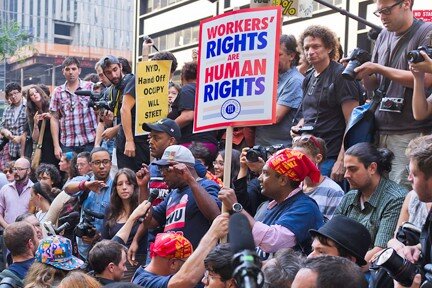Pat Miguel Tomaino
Director of Socially Responsible Investing
Download a PDF of this Impact Update
At Zevin Asset Management, we build responsible investment portfolios for our clients. We then address risks and create positive social impact by engaging with portfolio companies.
Shareholder Proposal Round-up
We use a range of techniques to move companies toward better environmental, social, and governance (ESG) practices, but shareholder proposals are often necessary to turn up the heat. In Q1, we received word that several of our proposals would appear on company ballots in the coming months:
© Robert S. Donovan, Stanford News
UPS: We continue to press the global logistics giant for a clear set of greenhouse gas (GHG) reduction goals that are based on the science of the Paris Climate Agreement. UPS’s current goal of a 12 percent reduction in absolute GHG emissions for global ground operations by 2025 is a good step. However, the company does not appear to be on track to meet this goal, and the goal does not include the Company’s airplane fleet, a significant driver of overall emissions. Neither does the goal commit UPS to the further reductions necessary to meet the net-zero emissions by 2050 required by the Paris Agreement. We published a public memo to bring these arguments to large investors and proxy advisory firms to build support for our proposal and show that, despite some strong efforts, UPS has yet to deliver.
T. Rowe Price: The much-needed changes at UPS would accelerate if all investors used their influence to spur climate action. Many large asset managers, like BlackRock and Vanguard, talk a big game, but they ultimately lag behind when it comes to supporting shareholder proposals addressing key climate risk issues at their portfolio companies. By failing to support more climate change-related shareholder proposals (and failing to keep pace with leading peers), T. Rowe Price and its subsidiaries could be missing critical opportunities to reveal issues at carbon-intense portfolio companies and risks across its investment portfolios.
T. Rowe Price has increased its support for certain climate-related shareholder proposals in recent years, and in another response to our pressure, the company has begun espousing the advice of the Taskforce on Climate-related Financial Disclosures (TCFD). However, T. Rowe Price still failed to support a majority of climate-related shareholder proposals and 70 percent of environmental proposals more broadly in 2020. That’s why we’re pressing for more change, an accountability report and a strong result at the company’s upcoming shareholder meeting.
Abbvie: We continue to challenge the pharmaceutical giant to fully disclose the money that it pays to third party groups that may use dues payments for lobbying that departs from its stated positions. From the text of our proposal:
AbbVie’s lack of disclosure presents reputational risk when its lobbying contradicts company public positions. For example, AbbVie believes patients need access to affordable medicines, yet funds PhRMA’s opposition to lower drug price initiatives. And AbbVie publicly supported COVID-19 efforts, but the Chamber of Commerce directly lobbied against using the Defense Production Act to speed production of personal protective equipment for workers.
Labor challenges
© Matt McDermott, randomlengthsnews.com
We’ll have updates on all the above measures next quarter. Meanwhile, we are also fighting to get our proposals on the ballot for shareholder meetings at Amazon and Kroger. Both companies have thousands of lower-wage essential workers who have borne the brunt of the COVID-19 pandemic. Our proposal at Kroger asks the grocery chain to consider extending its more generous emergency paid sick leave policy beyond the pandemic to help foster a safe and healthy workforce during the next pandemic or similar crisis. While our dialogue with Kroger was positive through 2020, the company has refused to take a clear position on paid sick leave and they’ve moved to strike our proposal.
In response, we wrote to the SEC, calling attention to labor unrest linked to a lack of clarity on benefits and the risks created by the company’s decision to play hardball with workers clamoring for a better deal. Early this year, Kroger announced that it would close two stores in Long Beach, California instead of complying with a new local law requiring pandemic-related hazard pay. The chain did the same in the Seattle area -- attracting negative community relations and bad press. If our proposal makes it to Kroger’s ballot, we’ll highlight the company’s chance to improve labor relations with a more structured approach to paid sick leave, and we hope to kindle a more constructive dialogue with the board of directors.
Speaking of labor unrest, our new proposal at Amazon directly challenges the company’s risky strategy with health and safety lapses and over-the-top anti-union tactics like those that were on display recently in Bessemer, Alabama. Our shareholder proposal, which has been challenged by Amazon at the SEC, urges the board of directors to adopt a policy requiring that the chair of the board be an independent director. The company claims that it will be moving in that direction as Jeff Bezos steps down as CEO and continues to serve only as executive chair. However, Mr. Bezos will still be conflicted by his long history as founding CEO, his massive stake in the company, and his ties to current executives and their decision making. Amazon obviously needs a better way to govern the risk-taking practices that its executive team authorizes. Our proposal, a commonsense corporate governance reform, would be a step in the right direction.
In Other News
We joined with other members of the Interfaith Center on Corporate Responsibility (ICCR) in engaging with Alphabet (Google), Facebook, and Twitter calling on their boards to address their role in enabling and facilitating violence at the U.S. Capitol and at state houses across the country in the run-up to inauguration day.
After we challenged Apple with a shareholder proposal in 2020 and met several times with senior executives, the company announced that it will tie a portion of executive pay to social goals. Apple has a long way to go on labor conditions in its supply chain and reducing the environmental footprint of manufacturing, but this is a good step toward accountability and a milestone for Zevin Asset Management and our investors. Read our February Impact Brief for more details.
In response to the shareholder proposal we co-sponsored with the New York City Comptroller’s Office, Home Depot agreed to annually disclose data on its workforce diversity.
Thanks for reading and sharing. For more on this work and our broader advocacy, join us on our website, Twitter, and LinkedIn. And please don’t hesitate to contact us (invest@zevin.com) with your questions, thoughts, and suggestions.



